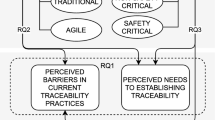Abstract
This chapter focuses on semi-automated tracing and the challenges and opportunities that it presents to traceability researchers and practitioners The chapter compares three tracing scenarios: manual, fully automated, and semi-automated. Related work in the area of semi-automated tracing is examined. In addition, the chapter presents a discussion of research questions that must be addressed in order to enhance our understanding of what constitutes the “best” automated tracing methods.
Access this chapter
Tax calculation will be finalised at checkout
Purchases are for personal use only
Similar content being viewed by others
Notes
- 1.
As well as any “work-in-progress” traceability matrix observed throughout the process.
- 2.
Key to such reality is the scarcity of potential participants in experimental studies. This makes any analyst-specific control (e.g., by education level, experience with tracing, etc.) harder to implement in practice.
References
Cuddeback, D., Dekhtyar, A., Hayes, J. H.: Automated requirements traceability: The study of human analysts. In: Proceedings of IEEE International Conference on Requirements Engineering (RE), Sydney, Australia (2010, September)
Dekhtyar, A., Dekhtyar, O., Holden, J., Hayes, J.H., Cuddeback, D., Kong, W.-K.: On human analyst performance in assisted requirements tracing: Statistical analysis. In: Proceedings of IEEE International Requirements Engineering Conference, Sydney, Australia (2011)
Dekhtyar, A., Hayes, J.H., Larsen, J.: Make the most of your time: How should the analyst work with automated traceability tools? Predictor Models in Software Engineering, International Workshop on, p. 4, Third International Workshop on Predictor Models in Software Engineering (PROMISE'07: ICSE Workshops 2007)
Egyed, A., Graf, F., Grünbacher, P.: Effort and quality of recovering requirements-to-code traces: Two exploratory experiments. Requirements Engineering, IEEE International Conference on, pp. 221–230, 2010 18th IEEE International Requirements Engineering Conference (2010)
Hayes, J.H., Dekhtyar, A.: A framework for comparing requirements tracing experiments. Int. J. Softw. Eng. Knowl. Eng. (IJSEKE) 15(5), 751–781 (2005, October)
Hayes, J.H., Dekhtyar, A., Sundaram, S.: Text mining for software engineering: How analyst feedback impacts final results. In: Proceedings of Workshop on Mining of Software Repositories (MSR), Associated with ICSE 2005b, pp. 58–62. St. Louis, MO (2005b, May)
Hayes, J.H., Dekhtyar, A., Sundaram, S.K., Holbrook, E.A., Vadlamudi, S., April, A.: REquirements TRacing on target (RETRO): Improving software maintenance through traceability recovery. Innov. Syst. Softw. Eng.: A NASA J. (ISSE) 3(3), 193–202 (2007)
iTrust: http://agile.csc.ncsu.edu/iTrust/wiki/doku.php. Last accessed 10 May 2011
Kong, W.-K., Hayes, J.H., Dekhtyar, A., Holden, J.: How do we trace requirements? An initial study of analyst behavior in trace validation tasks. In: Proceedings of 4th International Workshop on Cooperative and Human Aspects of Software Engineering (CHASE 2011), an ICSE workshop, pp. 32–39. ACM, New York, NY, USA
MODIS Science Data Processing Software Requirements Specification Version 2, SDST-089, GSFC SBRS (1997, 10 November)
Author information
Authors and Affiliations
Corresponding author
Editor information
Editors and Affiliations
Rights and permissions
Copyright information
© 2012 Springer-Verlag London Limited
About this chapter
Cite this chapter
Dekhtyar, A., Hayes, J.H. (2012). Studying the Role of Humans in the Traceability Loop. In: Cleland-Huang, J., Gotel, O., Zisman, A. (eds) Software and Systems Traceability. Springer, London. https://doi.org/10.1007/978-1-4471-2239-5_11
Download citation
DOI: https://doi.org/10.1007/978-1-4471-2239-5_11
Published:
Publisher Name: Springer, London
Print ISBN: 978-1-4471-2238-8
Online ISBN: 978-1-4471-2239-5
eBook Packages: Computer ScienceComputer Science (R0)




